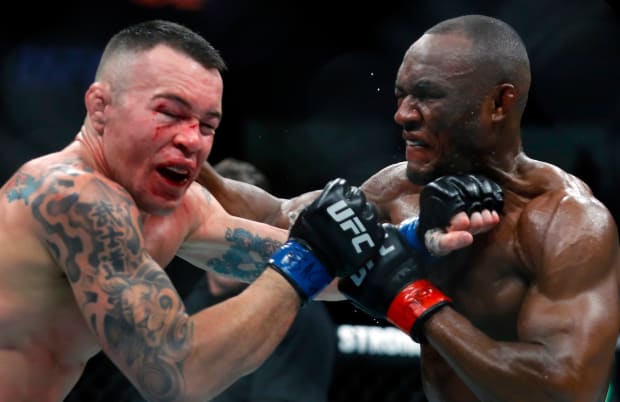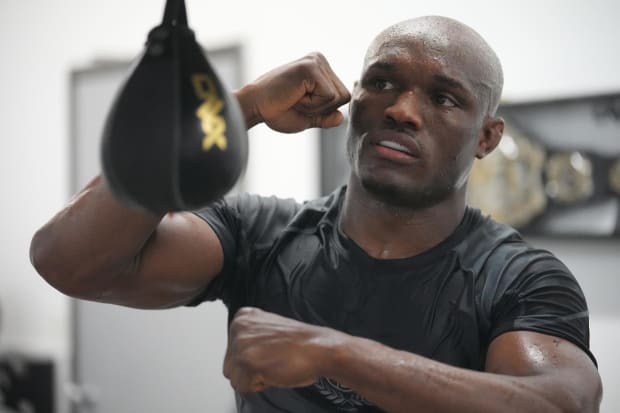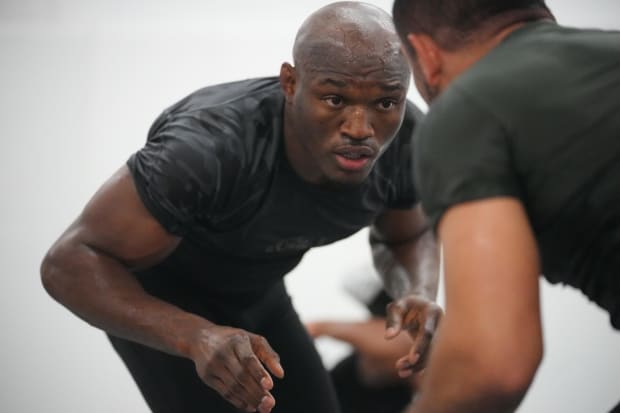On Saturday he'll fight Colby Covington, the promotion’s racist heel, at UFC 268. Is Usman ready for the brawl, and the unfortunate sideshow? Absolutely.
It’s not thick. In fact, it’s almost as if the thing has been swaddled in a sweatsuit while sitting in a sauna, strenuously committed to cutting weight. But there is a UFC rulebook. The few clauses include: no biting, no pulling hair, no intentional eye-poking, no fish-hooking (you don’t want to know), no kicking the head of a downed opponent.
If you really want to see an example of no-holds-barred lawlessness, though, check out the selling of a UFC fight. In the quest to manufacture hype and drum up pay-per-view buys, anything framing is fair game: Deceased parents. A wife’s chastity. Sisters. Mothers. Religion. Domestic violence. It’s all out there. When Conor McGregor turned to Floyd Mayweather at a press conference promoting their 2017 bout and, dripping with racism, taunted, “Dance for me, boy,” it offered a glimpse into how, even compared to the not-so-tame world of boxing, the MMA community was willing to let even the ugliest tactics fly.
And within this ruleless district, one fighter has distinguished himself. A UFC welterweight, Colby Covington, 33, dons a red MAGA cap in nearly all media appearances and talks trash that manages to be both over-the-top and plumbing new depths.

Erick W. Rasco/Sports Illustrated
After winning a fight against a Black opponent in 2020, Covington jawed: “You know the Black Lives Matter is a complete sham. It is a joke. They are complete terrorists. … They are taking these people that are criminals. You know, these aren’t people that are hard-working Americans. Blue-collar Americans. These are bad people. They are criminals.”
Covington then turned to selling his next fight, and calling out his future opponent, a native of Nigeria. "Did you get a call from freaking your little tribe?” he asked. “Did they give you some smoke signals?"
The object of Covington’s vitriol was—and is—the UFC welterweight champion, Kamaru Usman. Or as Covington has taken to calling him, “Marty Fakes News Man.” They fight Nov. 6 at Madison Square Garden, the main event on the UFC 268 card. And the selling and race-baiting has continued, America’s culture wars playing out in real time.
With support from the previous president, Covington claims he’s speaking candidly as an American and doesn't care whether he runs afoul of political correctness. The UFC watches this unfold with everyone-is-entitled-to-their-own-opinions isolationism. Usman’s fans and his camp contend that Covington’s remarks (shtick?) are unacceptable, less dog whistles than foghorns. Usman’s manager, Ali Abdelaziz, has described Covington flatly as a “racist scumbag.”
All this puts Usman himself into a rough position. Which, likely, is the point. If he responds, it’s a distraction from his training and his focus, and it only inflames tensions. If he doesn’t, he’s seen as passive or somehow even complicit. As if there’s not enough pressure defending your belt and risking life and limb when you step into a steel cage … now add that you’re supposed to be fighting for the honor of your race.
“It’s very difficult to hear certain things because these are powerful statements. These are things people have lost their lives over,” says Usman, 34. “We live in a generation where it’s all about entertainment. That’s fine. But for me personally, I’m not willing to cross those boundaries. I’m not willing to go into family. I’m not willing to go into religion. Some of the biggest wars in this world have been about [those subjects]. If that’s a knock on me, so be it.”
It’s here we note that their fight is a rematch. The first time Usman fought Covington, he took matters into his own hands (literally) and shut his opponent’s mouth (also literally). He connected on a punch and broke Covington’s jaw.

Steve Marcus/Getty Images
Kamaru Usman was already a college graduate in the fall of 2012, but in the Octagon, he was getting a crash course in evolutionary biology. It was his first professional mixed martial arts fight. He had sparred in the gym and exchanged blows with partners while wearing headgear and large gloves. But this was different, real. Early in this fight, Usman, then 25, danced around the ring and then threw a punch that connected violently with his opponent’s face. “I never felt anything like that,” he recalls. “I’m like, I don’t know if I like this.’ It was almost inhumane for me to hit this guy really maliciously and try to separate him from consciousness.”
Moments later, the opponent tagged Usman on the side of the skull. And any sympathetic impulses were quickly overwhelmed. “That’s when I was like, O.K., you better get your head in the game. We’ve got to get him out of here.” He did and he did. Lesson learned.
For all the accidental fighters, for all the UFC stars who stumbled upon the sport, Usman has a particularly unlikely origin story. He was born in Nigeria, the oldest of three brothers. When he was 2, his father left for the United States, settling outside Dallas, to try to construct a better life for the family. Muhammed Usman began working in pharmaceutical sales. He couldn’t afford to return home, but sent money back to Nigeria when he could. He once shipped a Nintendo console as a Christmas gift. There was a blackout in the village at the time, and it took a few weeks before the Usman boys finally realized the function of the plastic contraption.
When Kamaru was 8, the family reunited in Texas, where Muhammed was working in the medical health profession. Kamaru went to school, quickly picked up English and, as an athletic kid, played most sports. But he developed a special fondness for wrestling. He liked the autonomy of it and the incremental improvement. Keep lifting weights, and your body takes on different dimensions. Practice and repractice moves, and they become ingrained as muscle memory. Keep running laps, and your stamina improves. With little interest—much less prodding—from his parents, Usman developed into one of the best wrestlers in the state, going 53–3 as a senior at Bowie High School in Arlington.
He headed off to wrestle in college, first to William Penn in Iowa—where, at a party, he once bumped into another Iowa wrestler, Jon Jones—and then to Nebraska at Kearney. Both campuses were impossibly far removed from the Dallas suburbs, to say nothing of Nigeria. Usman staved off homesickness by focusing on his wrestling.
It also provided a welcome distraction from what was happening at home. In 2009, Muhammed was arrested at the family residence and charged with various counts of health care fraud. Prosecutors alleged that an ambulance company licensed to Muhammed had been submitting false invoices and false claims, most regarding transportation to fraudulent dialysis treatments. In May 2010, Muhammed was convicted on 14 charges, sentenced to 15 years in federal prison and ordered to pay restitution and fines of more than $1.3 million.
Kamaru pegs this as the moment his childhood officially ended. “I was actually at the airport about to board a flight back home to Texas when I got the call on the phone that my father was sentenced. At that moment I thought, What do I do now? Where I would have called home, now I instantly had to make decisions on my own. Hey Dad, I’m thinking of transferring. I’m thinking of this or that. Suddenly I didn’t have that anymore.”
Through the years, he wavered about how much he wanted to discuss his father’s incarceration. He took issue with the prosecution’s tactics, as well as with the verdict, but he didn’t want to relitigate the case in public. He didn’t want to bring embarrassment to his family. He coped through sports.
Within weeks of his father’s trial, Kamaru became the NCAA Division II champ at 174 lbs. and set his sights on making the U.S. team for the 2012 Olympics. When he didn’t make it, he turned onto the now-well-trod path from the mat to the cage—to mixed martial arts, this hybrid combat sport. Already masterful on the ground and defending takedowns, he quickly learned striking skills.
When he went to visit his father in prison he pulled out a phone. From behind the plexiglass, he showed his father a video of one of his sparring sessions. “This is what I want to do.” he said, half-stating and half-asking for approval. “I'm somewhat good enough to be safe at this.” Muhammed wasn’t thrilled but gave his son his blessing. A nod to his heritage, Usman took on the fighting nickname The Nigerian Nightmare.
In Usman’s second fight, he got caught in a rear naked choke and lost. That was the spring of 2013. “I had to cover my bases,” he says, “to make sure I didn’t feel that again.” He hasn’t lost since.

Erick W. Rasco/Sports Illustrated
Mixed martial arts has its own caste system and, for much of the next decade, Usman steadily rose to the top. He got his call-up to the bigs, his first UFC fight, in 2015. He won by decision, presaging the next few years. Like many wrestlers, Usman put substance over style and won with “ground-and-pound” effectiveness, not with flashy knockouts.
In March 2019, he fought for the title against the incumbent, Tyron Woodley, also a former Midwest wrestler. Muhammed Usman watched from prison, but Kamaru had two other special guests in the arena. The former heavyweight champ Samuel Peter and the former NFL running back Christian Okoye—both nicknamed The Nigerian Nightmare in their respective sports—were on hand.
That night, Usman comprehensively beat Woodley by decision to take the belt. The fight was perhaps more memorable for what happened afterward. Still panting and shirtless, Usman was confronted by Woodley’s mom backstage. Hugging the man who had just unseated her son, Deborah “Mama” Woodley told him: “It’s all good, baby. It’s all good. It’s all good. It’s all good, honey. Bless your heart. It’s all good. It’s your turn. It ain’t his turn. It’s your time. Be encouraged. You hear me? And keep on working ’cause they’re gonna come for you.”
She was right on all counts. It was Usman’s turn. He was 31 at the time and had the physical durability and the emotional reserves required for a champion in a growing sport that demands more and more time and emotional energy from its champions.
He also became the third current UFC belt-holder born in Africa. The current middleweight champ, Israel Adesanya of New Zealand, was born in Nigeria. The reigning heavyweight champ, Francis Ngannou, is Cameroonian. Usman has thought about the wealth of African champs and ends up here: “The vast majority of us are born into struggle, born into a situation where we can see clearly this is not the best you can be in life. All throughout life, even as a youth, you have to fight for everything. No handouts. And once you have it, no one is gonna stop you. That’s just a spirit that’s born into all of us.”

Erick W. Rasco/Sports Illustrated
Mama Woodley was also right that Usman’s life was about to get increasingly complicated. He began toggling between his home base in Florida and Denver, home of his coach Trevor Wittman. He was forced to spend more time than he cared to away from his wife, Eleslie, and their daughter, Samirah, who was born in 2014. There were more interview requests and publicity obligations and, with that, more questions about his father. And then, there were the challengers.
Usman first defended his new belt against Covington. Still another former college wrestler—after a DUI at Iowa, he transferred to Oregon State where he became an All-American—Covington has taken on the persona of the UFC’s heel.
On account of his alignment with Donald Trump, Covington has received congratulatory calls from the former president. (“I’m proud of you, man. I’m a big fan and I’m proud of you. … I appreciated the shout-out tonight, too. I’m your fan. You’re my fan. Two of a kind, two of a kind.”) Covington has traded on this. "I got the President of the United States, dragon energy,” he once told Usman.
In 2017, after defeating Brazil’s Demian Maia, he was booed by Brazilian fans. In response, Covington declared, “Brazil, you’re a dump! All you filthy animals suck.”

Usman beat Covington for the first time in December 2019. Usman then fought Jorge Masvidal of Miami on Fight Island during COVID-19. They rematched in April and, again, the trash talk grew ugly. (Masvidal, also a vocal Trump supporter, tweeted at one point, “You know who supports Trump? MLK family.”) Masvidal also vowed, “I’m happy, more than anything, because I get to break this guy’s face, then get paid for it.” Then, the inverse happened. Usman connected with a right and knocked Masvidal out cold.
Usman’s reward? The Nov. 6 rematch with Covington, who got the fight as much for his promotional chops as for his fighting chops. After the fight was announced, Covington was ready to sell. “When I see you,” he warned Usman, “you’re dead. I ain’t playing.”
This, unmistakably, benefits the UFC—at least in the short term. If the goal of prefight publicity is to goose the pay-per-view buys and capture media attention, this kind of friction is gold. Even before McGregor—winner of just one fight since 2016, but still the UFC’s biggest draw—had mastered the art, there were enough data points confirming that outrageousness sells. It’s not limited to MMA and it’s not even limited to nonfiction. Covington’s sound bites could have been lifted from Clubber Lang’s showing up and spewing vitriol at Rocky’s press conference. (And Apollo Creed’s directive to Rocky—”Give everyone a present and drop this chump”—could be lifted from any of a million #UFC268 social media posts supporting Usman.)
At the same time, it’s worth asking whether this is worthy of a sport still trying to move into the mainstream. The UFC might be trying to differentiate itself from WWE, but what is Covington if not a classic, cartoonish heel? The UFC has come a long way from the days of energy drinks and off-brand cellular carriers plastering their decals on the Octagon; but as the organization still tries to make NFL-style sponsorship deals with multinational companies, does it really want its fighters calling an entire country’s population “dirty animals”?
It is also worth asking: Is it fair to do this to an athlete? Make him—perhaps the best pound-for-pound fighter in the game, no less—either escalate an explicitly racialized conflict, or just go along with the promotion and absorb the kind of slurs that would be grounds for firing in most other workplaces?
Saturday night in New York, Usman will put his 18-fight win streak on the line. (His father, released from prison in March, will be in the stands.) Usman is the champion; Covington is a worthy challenger. Two fighters rematching; both former college wrestlers; born within a year of each other … In a vacuum, the fight should sell itself. But most of the buildup has been about Covington’s provocations and the subtext of culture war.
Usman sighs audibly when, inevitably, the topic comes up. But he has a philosophical take. While countless others simply seethe, at least he has a chance to fight the bully. “He can say whatever he wants to say. But when we signed a contract [to fight], I got a chance to do something about each and every word that he’s said. … The world is basically telling me, you have to go out there and do this for us. It’s a lot of pressure, but, you know, that’s what I’m built for.”
More Daily Cover stories:
• Tales From Tom Brady’s Forgotten Rookie Year
• Mystery and Controversy Surrounding the Original Rams Horns Helmet
• How a Women’s Football Team Took Control Away From the Men